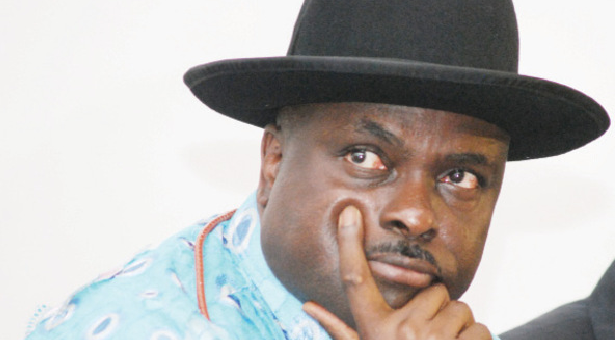Niger Delta: Ibori’s feisty fight of Year 2000
By Tony Eluemunor
It happened exactly 24 years ago. On 31 March 2000, the then Delta State Governor, His Excellency Chief James Onanefe Ibori, unfurled his true colours. The Fourth Republic was all of 10 months old and here and there, its main actors were still settling down, learning the ropes. But Ibori was of a different sort; he had convened a summit of South-South governors, legislators and leaders, with the challenging theme; “We Must Not Fail Our People.”
Ibori, Delta State governor, 1997-2007, had had enough of the duplicitousness of the PDP Federal Government led by President Olusegun Obasanjo, a party Governor Ibori also belonged, but which refused to activate the minimum 13 percent derivation principle enshrined in the Constitution. Instead the Federal Government was paying the one percent bequeathed to it by the outgone Military Administration.
Also the onshore and offshore dichotomy of natural gas and oil production was still being debated and the South-South was being denied its divine right. So, Ibori argued in his welcome address: “Section 162(2) then enacts the principles of allocation which include population density, equality of states, internal revenue generation, land mass and terrain, subject to an overriding proviso which states in part: ‘Provided that the principle of derivation shall be constantly reflected in any approved formula as being not less 13 percent of the revenue accruing to the Federation account directly from any natural resource. It is unfortunate that this well-intended provision has been subjected to all manner of interpretations and administrative manipulations and needless politicization to unjustly deny the States of the South-South zone their respective constitutional dues from the federation revenue”.
He continued: “Your Excellencies and Distinguished Legislators, the people and government of Delta State are unequivocally unable to accept the view that the implementation of Section 162 (2) of the Constitution is a condition precedent to giving effect to the payment of the minimum 13 percent principle of derivation in the interim system of revenue allocation enshrined in section 313 of the Constitution for the allocation Federation Account until an Act of the National Assembly is passed. The section states that as from the commencement of the Constitution on the 26th of May, 1999, the system of revenue allocation in existence for the financial year, beginning from 1st January, 1998 and ending 31st December, 1998, shall be the approved revenue allocation formula subject to the provisions of this Constitution. This percentage is not Subject to any administrative or legislative change, except upward review of the percentage or through a Constitutional amendment.
“Our call is justified even by the history of the principle of derivation, which is not a new factor in our fiscal federalism. In the 60s and early 70s the principle was fully recognized and in use. During the period the percentage weight of the principle was as high as 60 percent. Our nation was not less federal or poorer for it”.
Ibori then attacked the onshore/offshore dichotomy of oil and gas production: “The time has come for us, of the South-South zone, to have a dream. A dream to translate our patriotism, energy, talents, democratic wits and indeed all that is in us to free our people from every legislative shackle which is not in the socio-economic interest and aspirations of our people. We must speak and must act. The dichotomy between onshore and offshore oil and gas deposits is artificial and not in the best interest of our people. It is artificial because it is unnatural and not unconnected with the expropriation intention behind the Exclusive Economic Zone Act, as we all may recall, the Act was passed in 1978, delimiting the Exclusive Economic zone of our country and extended it up to 200 nautical miles seawards from the coasts”.
Dear reader, Ibori enlisted in that battle on behalf of the Niger Delta when he summoned that summit. It is a question for debate if he knew, by then, the extent of the backlash. What is not debatable is the danger, the strings and arrows, the lies and innuendos, media attacks, international conspiracies and the persecutions painted as legal prosecutions that were heaped against him. He was even accused of coup-plotting and a Nigerian President declared him wanted – “dead or alive”; a death sentence.
Many people today, including even the leaders and intellectuals of the Niger Delta do not remember that summit. Nigeria has forgotten how Niger Delta won the 13 percent derivation principle war and banished the Onshore and Offshore dichotomy, whereby oil revenue from the seas was said to belong entirely to Nigeria and with nothing going to the given littoral states. Forgotten, too, is that Ibori started the fight for the gains, and remained in it till victory was achieved.
READ ALSO: Between London route and Onyema’s patriotism: Celebrating an exhilarating dawn
Yet, present commentators who wax magisterial in condemning the governors of the Niger Delta for not turning each of their states into an Eldorado, have not asked why Nigeria remains a veritable backwater despite all she has earned from crude oil sales. Worse still, the commentators usually tell one lie; that the 13 percent derivative principle kicked in from May 1999. They never mention that the 13 percent derivation principle was not paid by the Obasanjo administration until it had spent about a year in office. They also forget that someone fought for that payment to be made and that all sorts of persecutions were visited on that person; James Onanefe Ibori.
Perhaps, enough notice was served that the summit of 31 March 2000 which took place in Asaba was not only viewed as brazen, impudent and impertinent by those in authority and who had power over life and death (let alone the law courts), when Ibori organized the second of such summits in the first week of March, four years later (in 2004) very many governors and legislators of the Niger Delta states were commanded to stay away from Ibori and his summit.
One of such men so commanded was the then National Vice Chairman (South-South) of the PDP, the late Chief A. K. Dikibo. That no nonsense man who could never have been accused of having the soul of a slave, told any and everyone who raised the matter with him that he would attend the Asaba summit that Ibori was organizing because it would benefit the Niger Delta.
Attempting to attend that summit was Dikibo’s second “grave sin”. The first one was that Dikibo had already set in motion his campaign to become the PDP National Chairman come 2007. The meaning was clear to the top members of the Obasanjo administration; by that time those at the commanding heights of both the PDP and the administration knew that a tenure elongation bid was on – to change the Constitution to give Obasanjo a third shot at the presidency instead of just two terms.
But if Dikibo was already preparing for his campaign to be PDP national Chairman, it means he did not support the third term bid.
Why? Oh, the answer is simply this; Nigeria’s political balancing act requires that both the National Chairman of the PDP and the presidential candidate will not come from the same geographical half of the country. One will be from either the South or the North. So, if Dikibo, from the South South geopolitical zone had his sights on the PDP chairmanship, it became obvious that he was not among the third term tenure elongation supporters.
And he was a Niger Delta rights adherent to boot; just like Ibori. On the 4th of March 2004, the day for the kickoff of that second summit, Dikibo had just flown into Port Harcourt, and entered into a motor vehicle to get to Asaba by road. Calls were flowing into his phone, attempting to stop him from attending that summit. When verbal reasoning couldn’t stop him, adequate force was applied. Someone came to him as he was sitting on the right hand side middle seat of the Toyota Land Cruiser. That devil’s agent placed a gun under Dikibo’s right side jaw, and squeezed the trigger. Both the bullet and the Dikibo’s brain matter hit the roof of the SUV. It was murder most foul and murder most effective.
It was a bold statement sent to convince any doubting Thomas that a killer cell existed somewhere near the seat of power. So, when later the attempt to impeach and remove the then Anambra State Governor, Dr. Chris Ngige from office became protracted, the then PDP chairman, Audu Ogbeh wrote Obasanjo an open letter that a killer nest existed and that it should not be allowed to kill Ngige.
And when later Ogbeh himself was forced to relinquish the PDP Chairman’s office, he explained why he disregarded his teeming supporters who wanted him to disdain Obasanjo’s efforts to make him resign as they fully supported him. His explanation of why he resigned: “If A.K. Dikibo had a choice to be killed or to resign, he would have resigned”.
Unfortunately, it just didn’t end there for Ibori. First, there was a concerted effort to stop him from being reelected as Governor of Delta State in 2003. Then the same case to get his 2003 election victory over-turned went to the Supreme Court two or three times. When he won them, his traducers didn’t take a break until he was railroaded into jail.
Unfortunately, when Nigerians discuss the Ibori affair, they do not remember that it all started from Ibori’s fight on behalf of the Niger Delta people. A simple love affair is all his woe; the love of his very own Niger Delta geopolitical region. Conversely, the President Obasanjo who headed the PDP Administration which willfully refused to pay the 13 percent derivation principle of mineral revenue to the deserving Niger Delta states for about a year, remains a hero. And when he agreed to pay the 13 percent derivative, his administration introduced another bottle neck; the onshore/offshore dichotomy. Still, this man, who couldn’t hold on to the Nigeria he received on May 29, 1999 but lost a large chunk of the country, the Bakassi Peninsula, is still a hero.
In 1999 the political party that the late Dr. Alex Ekwueme and the 49 wise men founded to save Nigeria from the ravages of tribalism by founding a non-ethnic political party, made Obasanjo Nigeria’s President. Then the man destroyed the PDP. He took full control of the party, his Man Friday, Col Ahmadu Ali (retired), became the garrison commander and the party began to weed out members.
Many Nigerians may not remember that Obasanjo once said that he did not know who would succeed him, but he knew those who would not succeed him. Well, he succeeded so well in that assignment that since 2015, he has spent the whole time since 2015 plotting to build up a coalition; and that is a big joke – only politicians build political parties. Obasanjo could not even make himself president; Generals Ibrahim Babangida, T. Y. Danjuma, Aliyu Gusua and Abdulsalami Abubakar made him President.
Ah, poor Nigeria!
Well, Ibori should take solace in the fact that he is still alive – after President Jonathan declared him “wanted; dead or alive”. That he is still alive is a miracle.











